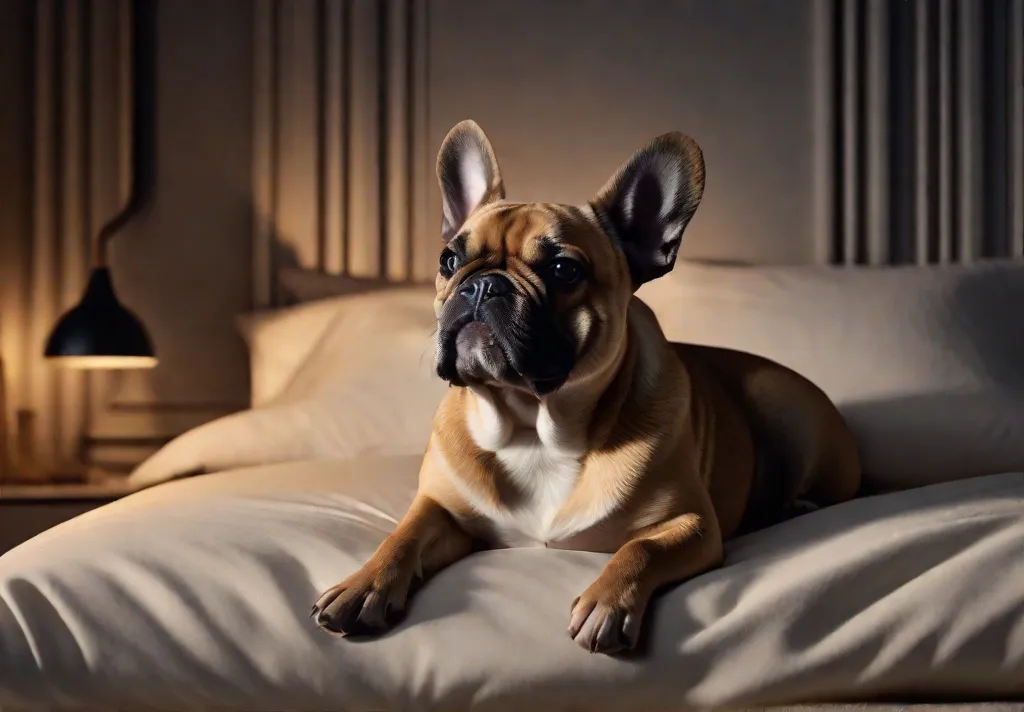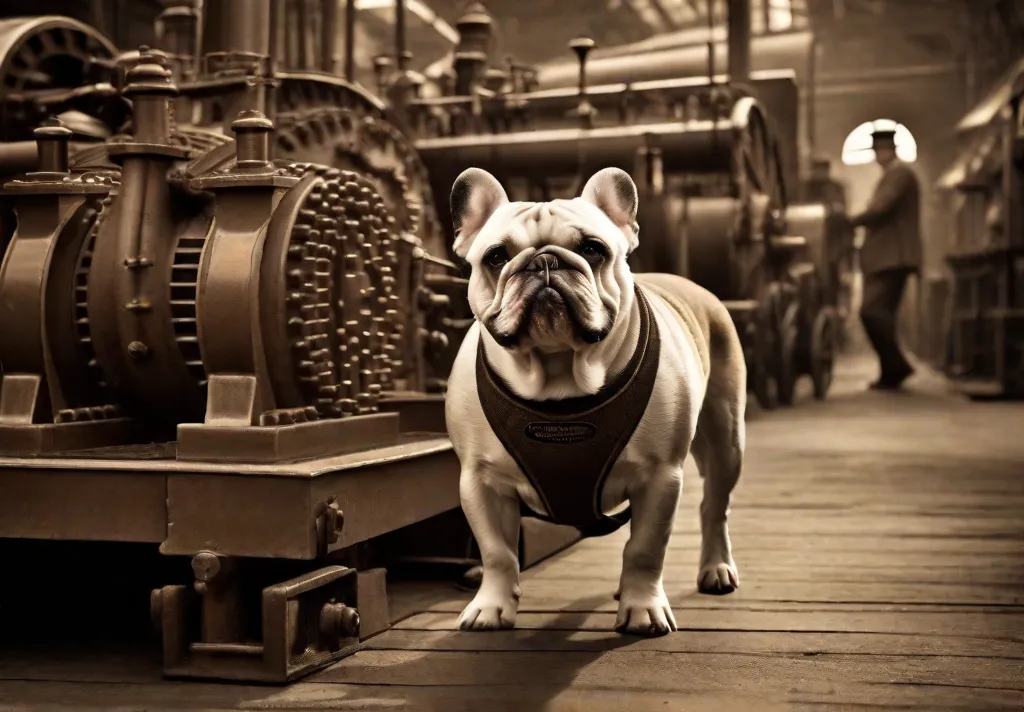With millions of Instagram followers and counting, the French Bulldog has captured hearts worldwide with its affectionate nature, amusing antics, and adorable appearance. But how much do you know about this captivating canine companion?
Get ready to be amazed as we explore ten fascinating facts about French Bulldogs, guaranteed to surprise even the most seasoned Frenchie fan. From their intriguing origins to quirky habits, this inside scoop will deepen your appreciation for your wrinkly, bat-eared best friend.
Table of Contents
- 1 A Historic Migration Led to the French Bulldog’s Distinctive “French” Label
- 2 The French Bulldog’s Signature “Bat Ears” Once Served a Practical Purpose
- 3 Brachycephalic Features Give Them Their Signature “Smushed Face”
- 4 They’re Surprisingly Strong and Athletic!
- 5 They “Talk” in the Most Endearing Ways
- 6 Beware the Infamous Frenchie Farts!
- 7 They Snore Loud Enough to Wake the Dead!
- 8 They’re Total Love Sponges Who Crave Cuddles
- 9 Frequently Asked Questions
- 10 Related posts:
- 11 French Bulldog Life Expectancy: Maximizing Longevity and Health
- 12 9 Exclusive Products Every French Bulldog Enthusiast Should Have
- 13 Unleashing the French Bulldog Personality: Facts & Traits
- 14 Why French Bulldog Puppies are the Ultimate Apartment Companions
A Historic Migration Led to the French Bulldog’s Distinctive “French” Label
Believe it or not, Frenchies originated in England, not France! During the Industrial Revolution, Toy Bulldogs were bred to create small, affectionate companions ideally suited for city living spaces. These “Toy” or “Mini” Bulldogs accompanied English lace workers and gained popularity among textile workers crammed into small apartments.

However, when lace artisans relocated from England to France for better opportunities, they inevitably brought their beloved Toy Bulldogs. Nicknamed “Bouledogue Francais” by the French, these compact canines won over Parisians’ hearts and became firmly established in France by the late 1800s.
The Americans also played a pivotal role in promoting the breed stateside, leading the American Kennel Club to recognize the French Bulldog. This intriguing backstory explains how the “French” Bulldog got its name through an unexpected migration!
How to Discover Your Frenchie’s Origins
Want to learn more about your French Bulldog’s unique background? Consider contacting their breeder to trace their lineage or using a doggie DNA test kit for fun insights into their ancestry!
The French Bulldog’s Signature “Bat Ears” Once Served a Practical Purpose
Take a moment to admire your Frenchie’s charmingly oversized, erect ears that resemble little bat wings. Beyond giving them an adorable appearance, these prominent ears initially served a valuable purpose.
Back when Frenchies accompanied lace workers in factories, their sizable ears helped detect the presence of lace moths. These pesky insects could destroy delicate lace products, so the dogs’ heightened sense of hearing helped alert workers to approaching moths. Their upright ears allowed better localization of faint sounds compared to floppy ears.

Over time, French Bulldog breeders selectively bred dogs with more oversized, prominent ears, as this trait was incredibly useful in their traditional role. Eventually, the bat-like ears became a breed standard, so Frenchies sport these eye-catching features today!
Keep Those Ears Clean!
Don’t forget to clean your ear regularly with a gentle wipe to prevent infections in those cute bat ears!
Brachycephalic Features Give Them Their Signature “Smushed Face”
The French Bulldog belongs to a ” brachycephalic breed,” meaning they possess a pushed-in facial structure. Their short skull, compact muzzle, and flat face result from selective breeding to produce these exaggerated physical traits.
This signature smushed face may add to their appeal, but it can lead to some health considerations:
- Narrowed Airways: Prone to breathing issues, snoring and overheating
- Dental Crowding: Tight jaw structure increases dental disease risk
- Eye Problems: Protruding eyes vulnerable to injuries, ulcers

However, reputable breeders aim to moderate extreme physical features to produce healthier, well-bred French Bulldogs.
Support Their Sensitive Airways
Ensure your Frenchie has access to fresh, cool water and shaded spots, and avoid overexertion during walks or playtime.
They’re Surprisingly Strong and Athletic!
Although only 12 inches tall and weighing under 28 pounds, French Bulldogs possess impressive strength and agility. Their muscular build and laidback nature make them the perfect apartment dogs, able to sprint through narrow hallways and curl up on cozy laps.
But don’t let their small size fool you – these feisty pups pack a punch! Frenchies excel in dog sports like barn hunts, agility courses, and obedience trials, effortlessly navigating tunnels, ramps, and hurdles. Their compact build allows them to zip through tight spaces most dogs can’t access.

So, if you’re seeking a pint-sized puppy full of power, the French Bulldog fits the bill!
Let Them Strut Their Stuff!
Allow your athletic Frenchie to showcase their strength by installing a miniature agility course or challenging puzzle toys. But don’t overdo it – these short-nosed pups are prone to overheating.
They “Talk” in the Most Endearing Ways
One of the most delightful and hilarious French Bulldog traits is their tendency to “talk” with dramatic yawns, grunts, or yowls. These chatty canines express themselves through barks, snorts, and other vocalizations.
Some even make an odd “yodeling” sound when excited, which owners find both baffling and amusing! Each Frenchie seems to have a vocabulary that their people learn to interpret over time. So don’t be surprised if your French Bulldog starts carrying on entire conversations with their hilarious “dialogue.”

Let Them Speak!
Pay attention when your vocal Frenchie tries to “communicate” – they may be requesting dinner, playtime, or just your attention!
Beware the Infamous Frenchie Farts!
Fair warning: French Bulldogs are notoriously gassy dogs, hence their hilarious nickname “French Pooters”! Due to their brachycephalic anatomy, they tend to swallow more air, which then has to…escape somehow.
Combine that with their penchant for snacking and sensitivity to certain foods, and this breed often produces musical sound effects. But do not worry – a healthy diet, probiotics, and gentle tummy rubs can help ease their digestive woes. Until then, laugh, waft, and forgive your gassy Frenchie!

Reduce the SBDs
If your house sounds like a symphony orchestra, try probiotic supplements and diet changes to settle your sensitive stomach.
They Snore Loud Enough to Wake the Dead!
French Bulldogs are renowned for their thunderous snores that resemble revolving chainsaws, thanks to their squished faces. Their short muzzles and elongated soft palates vibrate loudly with each breath. Owners swear even earplugs can’t block the noise!
Some snore softly, but many Frenchies truly rattle the rafters, especially if sleeping on their backs. But don’t worry – loud snoring is regular for brachycephalic breeds. Just be prepared for some sleepless nights with these boisterous sleepers!

Catch Some ZZZs
Help your snoring Frenchie (and yourself) get some shut-eye by providing them with a comfortable orthopedic bed and keeping them out of dusty rooms.
They’re Total Love Sponges Who Crave Cuddles
Despite some silly quirks, French Bulldogs have hearts of gold and affectionate natures that make them ideal companions. They form powerful bonds with their families and prefer the company of their beloved people.
This velcro breed wants to be stuck to your side 24/7! Frenchies shower their lucky owners with sloppy kisses, nuzzles, and cuddles at every chance. They even tuck into bed with their humans or curl into the warmest lap they can find!
So, if you’re seeking a loyal best friend who thinks they’re a lap dog, look no further than the sweet Frenchie. Just be prepared for nonstop canine affection!

Soak Up the Love
Dedicate plenty of one-on-one time to bond with your affectionate Frenchie through playtime, training sessions, and long snuggle sessions.
Frequently Asked Questions
Q: Are French Bulldogs good family pets?
A: Yes! Frenchies get along wonderfully with children thanks to their friendly personality, moderate energy levels, and small size. However, always supervise young kids to avoid injuries.
Q: How much exercise does a French Bulldog need?
A: About 30 minutes of activity per day. Take them on short walks and engage in regular playtime. Avoid overexertion in hot weather.
Q: What health issues are common in French Bulldogs?
A: Brachycephalic Syndrome, hip dysplasia, allergies, cherry eye and spinal disorders. Reputable breeders screen for health conditions.
Q: Are French Bulldogs easy to train?
A: Yes, but training should start early using positive reinforcement. They aim to please make them open to training.
Q: Can French Bulldogs be left alone for long periods?
A: No. Their extreme attachment to owners means they require plenty of companionship. If alone for over 4 hours, consider doggie daycare.
Through this inside scoop into the captivating world of French Bulldogs, hopefully, you have gained a more profound admiration for these charming clowns of the canine world! Despite some silly quirks, their unwavering affection and loyalty as companions are unmatched.
So embrace your Frenchie’s farts, snores, and barks – because life is always more amusing with their hilarious antics brightening your days! Just be prepared for a Velcro dog wanting to stick to your side.